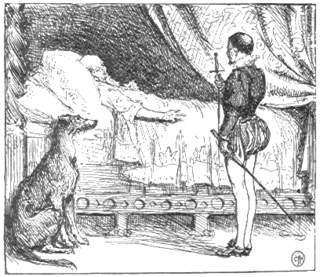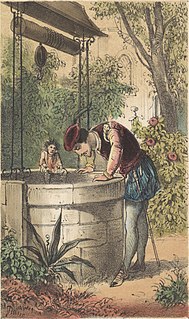
"The Golden Goose" is a fairy tale collected by the Brothers Grimm. It is a tale of Aarne-Thompson type 571, with an episode of type 513B.
The Blue Light is a Brothers Grimm fairy tale about a soldier who finds a magical object that provides him a supernatural helper. Many of the features from Hans Christian Andersen's later work The Tinderbox and from the story of Aladdin and his magic lamp originate with this version.

King Thrushbeard is a German fairy tale collected by the Brothers Grimm. It is of Aarne–Thompson type 900.

"The Singing, Springing Lark", "The Singing, Soaring Lark", "The Lady and the Lion" or "Lily and the Lion" is a German fairy tale collected by the Brothers Grimm, appearing as tale no. 88.

"Maid Maleen" is a German fairy tale collected by the Brothers Grimm, number 198.

"Trusty John", "Faithful John", "Faithful Johannes", or "John the True" is a German fairy tale collected by the Brothers Grimm and published in Grimm's Fairy Tales in 1819. Andrew Lang included it in The Blue Fairy Book.

"The Hut in the Forest" is a German fairy tale collected by the Brothers Grimm. Andrew Lang included it in The Pink Fairy Book (1897). It is Aarne-Thompson type 431.
"The Goose-Girl at the Well" is a German fairy tale collected by the Brothers Grimm. It is Aarne-Thompson type 923.
The Blue Mountains is a fairy tale. Andrew Lang included it in The Yellow Fairy Book (1894), but provided no bibliographical information and its origin remains obscure.
The Ram is a French literary fairy tale by Madame d'Aulnoy.
"The Riddle" is a German fairy tale collected by the Brothers Grimm in Grimm's Fairy Tales in 1819. It is of Aarne-Thompson type 851.

The Knights of the Fish is a Spanish fairy tale collected by Fernán Caballero in Cuentos. Oraciones y Adivinas. Andrew Lang included it in The Brown Fairy Book. A translation was published in Golden Rod Fairy Book. Another version of the tale appears in A Book of Enchantments and Curses by Ruth Manning-Sanders.
"The True Bride" or "The True Sweetheart" is a German fairy tale collected by the Brothers Grimm in Grimm's Fairy Tales as tale 186.
"The Griffin" is a German fairy tale collected by the Brothers Grimm in Grimm's Fairy Tales.

"The King of the Golden Mountain" is a German fairy tale collected by the Brothers Grimm in Grimm's Fairy Tales.
Father Roquelaure is a French fairy tale collected by Achille Millien.
Georgic and Merlin is a French fairy tale collected by François Cadic in "La Paroisse bretonne".
"The Sea-Hare'" is a German fairy tale collected by the Brothers Grimm, number 191.

"The Gnome" is a German fairy tale collected by the Brothers Grimm in Grimm's Fairy Tales, tale number 91.
"The Little Peasant" is a German fairy tale collected by the Brothers Grimm in Grimm's Fairy Tales, number 61.








